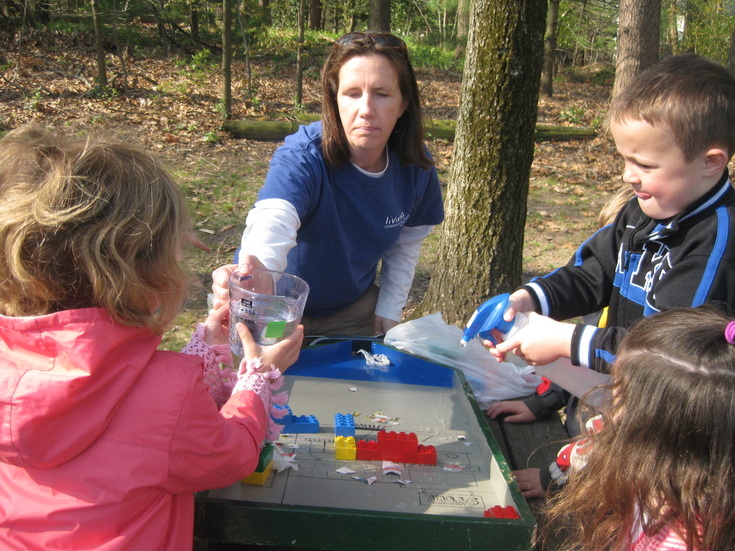All of our students learn about water pollution sources and prevention in their curriculum. The 3 and 4 year olds (approximately 45 students) discuss the Chesapeake Bay Watershed and build a model out of play dough, add different forms of pollution, and have a “rainstorm” to wash it into the bay. This lesson on runoff pollution prevention is tied to our daily practices of reducing, reusing, and recycling, as well as litter prevention. Our teachers created a Runoff Model for use by our own staff, as shown with our 4 year old class in 2017.
Water Conservation is practiced in our school by staff and parent volunteers. Our students are also monitored during their hand washing at all times during the day to ensure that water conservation practices are learned by the students.
Rain Gardens: Our 520 sq. feet of Rain Gardens and erosion control measures were implemented with water pollution prevention in mind. The gardens are labeled as rain gardens because of the naturally moist soil, resulting from a shady environment, sandy soil, and abundant downspout drainage in the direct area. Our students and families maintain our rain gardens with our biannual Garden Celebrations.
Rain Barrels: Rain barrels are used by students to water the gardens and for outdoor water play. We have 4 rain barrels, one at each down spout, to provide environmental benefits and reduce erosion and flooding at each location. Our rain barrels capture rain water for future garden watering, thus improving the health of the garden and conserving water. Through 2019 we continue to maintain and utilize the rain gardens and rain barrels.
Rain Barrels: Rain barrels are used by students to water the gardens and for outdoor water play. We have 4 rain barrels, one at each down spout, to provide environmental benefits and reduce erosion and flooding at each location. Our rain barrels capture rain water for future garden watering, thus improving the health of the garden and conserving water. Through 2019 we continue to maintain and utilize the rain gardens and rain barrels.
Erosion prevention measures: Mulching is a regular practice in our gardens to prevent erosion and build up organic material for future plant health. We also add wood chips to our Outdoor Classroom and pathways several times per year to prevent erosion. To create an erosion-free path from the parking lot to our Outdoor Classroom and front entryway, in 2017 we rebuilt our fence and gate to circumvent a sloping, eroding area and incorporate a wooden walkway and mulched footpath. We continue to wood chip that path and plant grass seed around it to prevent erosion. We also regularly wood chip around our playground equipment and our schoolyard trees to prevent erosion and root exposure. In fall 2018, we consulted with a Master Gardener for advice on managing a floodplain area at the bottom of our forest trail system.

